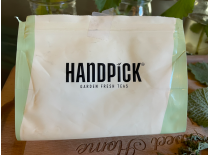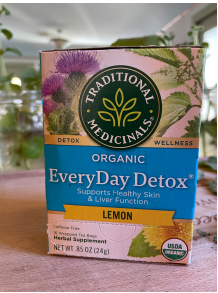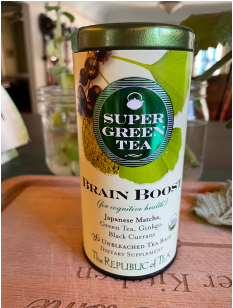How Teas Help With Spinal Cord Injuries (And Everyday Health)
Whether you’re a coffee or a tea drinker, it’s hard to deny the natural healing qualities of tea. These qualities also help spinal cord injury survivors, like Celeste, manage challenges that come with a spinal cord injury and their everyday health. Like our previous “How THC and CBD Products Help With Spinal Cord Injuries” blog, we’ll be taking you through the teas Celeste uses frequently and how they help her journey to get back on her feet.
Handpick Turmeric Ginger
Turmeric and ginger are a powerful and healthy combination when combatting inflammation and digestive issues. Mary-Eve Brown, an oncology clinical dietitian/nutritionist at Johns Hopkins Medicine explains that the active ingredient in turmeric is a natural compound (polyphenol) called curcumin, which has both antioxidant and anti-inflammatory properties. Harvard Health Publishing states “Ginger’s digestive health benefits are largely attributed to the presence of gingerol, a bioactive compound that boosts the rate at which food exits the stomach and moves through the digestive process.”
Rooibos Reishi Mushroom
According to the National Library of Medicine, rooibos has been shown to enhance lipid profiles (how much fat is in your bloodstream), boost antioxidant status and lower blood glucose levels.
The National Library of Medicine also states that reishi mushrooms, which are rich in antioxidants and beta-glucan (dietary fiber), may help enhance the body’s immune system by stimulating white blood cell production. The mushrooms also contain compounds that may calm your nervous system, helping you get better sleep. Lastly, some research suggests reishi mushrooms may also help alleviate anxiety and depression, offering a natural way to support mental health.
“Reishi mushrooms contain compounds called triterpenes and polysaccharides that may have anticancer and anti-tumor-development properties, but more research is needed on this subject,” say Adam Meyer and Christa Brown, dietitians at EatingWell. “Nothing has been proved yet, but some studies show that cordyceps might reduce inflammation in the body, fight free radicals that damage cells, lower blood sugar levels, and improve kidney health.”
Burdock Dandelion Nettles
Another great tea for antioxidants, fiber, digestion and more, “burdock contains phenolic acids, quercetin and luteolin, which are all powerful antioxidants. Burdock also has inulin, a natural dietary fiber used to improve digestion. It also has prebiotic properties that could improve overall health” (Mount Sinai).
Also according to Mount Sinai, “dandelion leaves act as a diuretic, increasing the amount of urine your body makes. The leaves are also used to stimulate the appetite and help digestion. The flower itself has antioxidant properties too and may help improve the immune system.”
Mount Sinai also states “stinging nettle has been used for hundreds of years to treat painful muscles and joints, eczema, arthritis, gout, and anemia. When they come into contact with a painful area of the body, however, they can actually decrease the original pain. Scientists think nettle does this by reducing levels of inflammatory chemicals in the body, and by interfering with the way the body transmits pain signals.” Something that greatly helps spinal cord injury survivors.
Brain Boost Super Green Tea
The Brain Boost Super Green Tea contains ginkgo, matcha, antioxidants and black currants. Below are the benefits of each component found in this super tea.
According to Mayo Clinic, “The most helpful components of ginkgo are believed to be flavonoids, which have powerful antioxidant qualities, and terpenoids, which help improve circulation by dilating blood vessels and reducing the ‘stickiness’ of platelets.”
Japanese Matcha has antioxidants called catechins that can help lower blood pressure and cholesterol levels. Furthermore, the amino acid L-theanine found in matcha has been associated with improved concentration and alertness (Harvard Health).
According to the Cleveland Clinic, “Catechins (antioxidants) in green tea help fight inflammation and diabetes while improving memory and heart health.” “Green tea also reduces anxiety, lowers cholesterol, protects brain health, keeps bones healthy and increases life expectancy,” says registered dietitian Julia Zumpano, RD, LD.
The last notable ingredient in this tea is black currant, a superfood due to its high concentration of antioxidants, particularly anthocyanins. These antioxidants offer numerous health benefits including boosting the immune system, reducing inflammation, improving eye health, potentially protecting against cardiovascular disease, and supporting healthy aging thanks to their potent antioxidant properties; they are also notably high in vitamin C, exceeding the amount found in oranges.
Turmeric Lion’s Mane Ginger Rooibos Black Peppercorn
This is the second turmeric tea on this list, but the ingredient to focus on here is black pepper. Medical News Today states “there are several potential health benefits of black pepper for the body and brain, and many of them come from the black pepper compound piperine which has strong antioxidant and anti-inflammatory properties. Research also suggests black pepper may help boost nutrient absorption, and display prebiotic-like behavior, helping regulate intestinal microbiota and enhance gastrointestinal health.”
The second notable ingredient in this tea is lion’s mane, a kind of mushroom. According to Mayo Clinic, “Researchers have found that incorporating any variety of mushrooms into your daily diet will lower your risk of cancer by as much as 45%.” What’s more important for Celeste and other spinal cord injury survivors is “Mushrooms also are a natural source of fiber, which promotes gut health by feeding the ‘good’ bacteria in the intestines. These bacteria have been found to make neurotransmitters or chemicals that send messages between nerves. These neurotransmitters promote mood stability, concentration, brain health and mental well-being. One mushroom that's been getting a lot of attention when it comes to brain health is the lion's mane, identified by its long, white, fluffy top. Early research shows the lion's mane's potential to protect against neurological damage and promote the growth of nerve tissue.”
Dandelion Chai Probiotic
Another dandelion-based tea, the National Library of Medicine says, “Dandelions have high levels of phenolic compounds, including phenolic acids, with antioxidant properties and coumarins with anticancer, anti-inflammatory, antibacterial, and antithrombotic effects. The roots are also rich in inulin, which has a probiotic, hypoglycemic, and immune-boosting effect.”
Furthermore, the chai in the tea is combined with cardamom, cinnamon and ginger for probiotic and digestive support.
Celeste brews all of these teas in one big batch for a long time, creating a stronger taste. Later, she either heats up a small cup with a little honey or dilutes it with water and ice for drinking cold. The flavor is smooth, rich and woody. It is a power pack of antioxidants, anti-inflammatories, pro and prebiotics, and vitamins galore. We have only touched on some of the highlights these products offer, but these six teas are a great start to improving your overall health and managing the everyday challenges of a spinal cord injury.
As always, if you have any questions, or want to learn more about our mission, please contact us!







